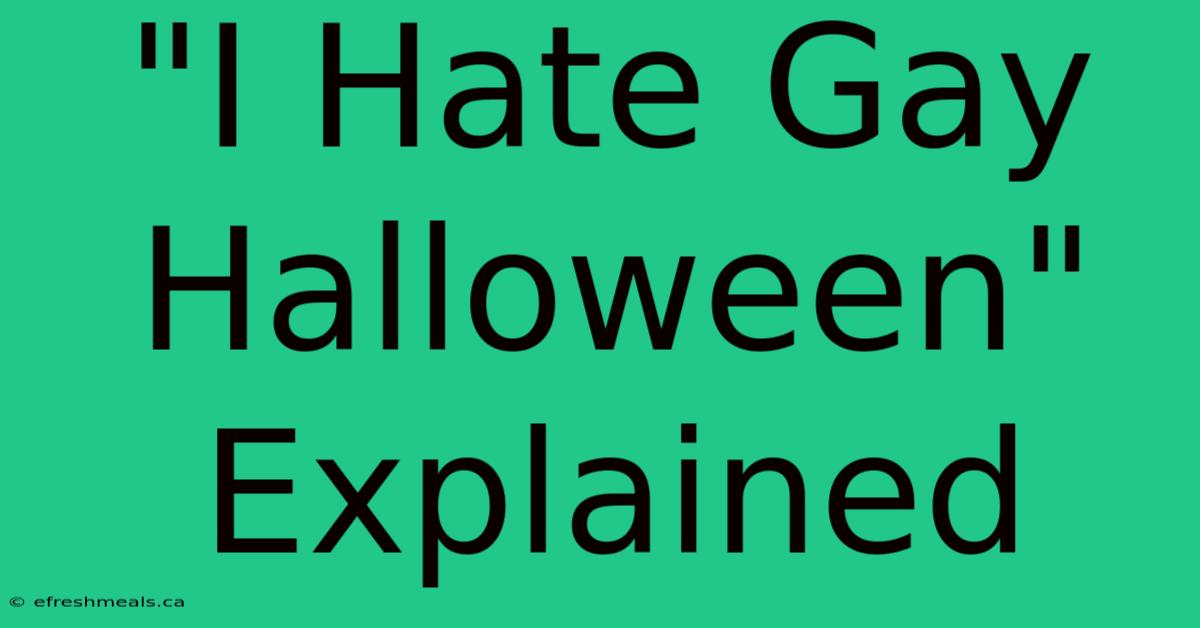"I Hate Gay Halloween" Explained

Discover more detailed and exciting information on our website. Click the link below to start your adventure: Visit Best Website nimila.me. Don't miss out!
Table of Contents
"I Hate Gay Halloween" Explained: Unpacking the Controversial Hashtag
Have you ever stumbled upon the hashtag #IHateGayHalloween on social media? This inflammatory phrase, often used alongside homophobic rhetoric, has sparked outrage and confusion online. But what does it actually mean, and why is it so controversial?
Why It Matters: Understanding the "I Hate Gay Halloween" hashtag is crucial for combating online hate speech and promoting inclusivity. It's important to recognize the deep-seated homophobia fueling these sentiments and to challenge the harmful narratives they perpetuate.
Key Takeaways of #IHateGayHalloween:
| Takeaway | Explanation |
|---|---|
| Homophobic Sentiment: | The hashtag reflects a deep-seated hatred and prejudice against LGBTQ+ individuals, often stemming from discriminatory views about sexuality and gender identity. |
| Misinterpretation of LGBTQ+ Celebrations: | This hashtag misinterprets LGBTQ+ gatherings and celebrations as a threat or a challenge to traditional values. |
| Online Hate Speech: | The hashtag contributes to a toxic online environment, perpetuating hate speech and inciting discrimination against LGBTQ+ individuals. |
| Harmful Consequences: | Such online hate speech can lead to real-world harm, including verbal abuse, physical attacks, and psychological distress for LGBTQ+ individuals. |
"I Hate Gay Halloween" Decoded: Unpacking the Rhetoric
The "I Hate Gay Halloween" hashtag emerges from a distorted view of LGBTQ+ identity and celebrations. Often, the phrase is used to express anger or discomfort with visible LGBTQ+ representation, particularly during events like Halloween. This discomfort can be fueled by misconceptions about LGBTQ+ identities and a fear of societal change.
Here's a breakdown of some common arguments behind the hashtag:
1. "It's about promoting LGBTQ+ agendas": This argument often overlooks the simple act of celebrating and expressing oneself freely. LGBTQ+ individuals are simply seeking to participate in a shared cultural experience, not to impose their identities on others.
2. "It's inappropriate for children": This argument often centers around a fear of LGBTQ+ visibility and influence on children. However, it's important to remember that LGBTQ+ people are part of every community, including families with children.
3. "It's a threat to traditional values": This argument suggests that LGBTQ+ inclusion undermines societal norms. However, celebrating diversity and promoting acceptance are fundamental values that strengthen a society.
Combating Hate Speech: What Can We Do?
It's vital to recognize that hate speech is not a matter of opinion but a harmful act. Here's what we can do to counter "I Hate Gay Halloween" and similar sentiments:
- Challenge the Rhetoric: Respond to hateful posts with factual information and counter-arguments, highlighting the positive aspects of LGBTQ+ inclusion.
- Promote Visibility: Support LGBTQ+ organizations and initiatives that promote understanding and acceptance.
- Report Hate Speech: Report hateful content to social media platforms and other online services.
- Educate Others: Talk to family, friends, and colleagues about the harmful effects of hate speech and how to combat it.
FAQ: "I Hate Gay Halloween"
Q: Is it acceptable to disagree with someone's sexual orientation?
A: Disagreeing with someone's sexual orientation is not acceptable. It's essential to recognize that LGBTQ+ individuals have the right to exist and express themselves freely, just like everyone else.
Q: What should I do if I encounter "I Hate Gay Halloween" online?
A: Report the content to the platform, avoid engaging with the hate speech, and focus on spreading positive messages of acceptance and inclusion.
Q: How can I help create a more inclusive environment?
**A: ** Speak up against discrimination, support LGBTQ+ organizations, and promote understanding and respect for all individuals, regardless of their sexual orientation or gender identity.
Tips to Combat Homophobia Online
Here are some tips for navigating online spaces and combating homophobia:
- Be mindful of your own language: Use inclusive language and challenge homophobic terms.
- Be a source of information: Share articles, resources, and stories that promote LGBTQ+ understanding.
- Support LGBTQ+ creators: Engage with LGBTQ+ content creators and influencers online.
- Use your platform for good: Share positive messages of acceptance and inclusivity on your social media.
Summary of "I Hate Gay Halloween": Combating Hate Speech
"I Hate Gay Halloween" is a deeply problematic hashtag that reflects harmful, homophobic attitudes. It's essential to challenge these sentiments, promote inclusivity, and stand in solidarity with LGBTQ+ individuals. By understanding the roots of this hate speech and taking proactive steps to combat it, we can work towards a more inclusive and welcoming online space.

Thank you for visiting our website wich cover about "I Hate Gay Halloween" Explained. We hope the information provided has been useful to you. Feel free to contact us if you have any questions or need further assistance. See you next time and dont miss to bookmark.
Featured Posts
-
Frances Halloween More Than Trick Or Treat
Nov 01, 2024
-
Kodi Lees Powerful Vocals Fill Arena At National
Nov 01, 2024
-
Overtime Victory Pacers Down Celtics 135 132
Nov 01, 2024
-
Young Thug Admits Gang Drug Gun Charges
Nov 01, 2024
-
Opp Probe Serious Hwy 401 Essex County Crash
Nov 01, 2024
